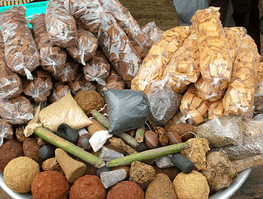Ghanaian hospitals to get medical herbalists soon
 Mr Kwaku Agyeman-Manu, the Minister of Health, said the Ministry would ensure that every hospital soon gets medical herbalists, to supplement and improve healthcare delivery.
Mr Kwaku Agyeman-Manu, the Minister of Health, said the Ministry would ensure that every hospital soon gets medical herbalists, to supplement and improve healthcare delivery.
Medical herbalists are trained to incorporate scientific methods into their work, to upgrade their practice and polish their arts.
He said the Ministry is striving to develop traditional medicines to the levels of countries like China.
“Therefore there is the need to build the human resource capacity in readiness to support efforts by the Ministry,” he said in his speech.
Mr Agyeman-Manu said this in a speech read on his behalf in Accra, at the commemoration of the 17th African Traditional Medicine Day and the Launch of Ghana’s 20th Anniversary in Traditional Medicine.
It was on the theme: “Integration of Traditional Medicine in the Curricula of Health Science Students in Universities of the African Region.”
Mr Agyeman-Manu said Ghana is a growing market for traditional medicine with the Traditional Medicine Practice Council receiving a number of licensing applications on daily basis.
“This year alone there has been more than 800 applications received, this obviously has a positive economic implication on the nation’s development,” he said.
The World Health Organisation (WHO) recorded that 80 per cent of rural dwellers patronised herbal medicine, however many in the urban areas used such medications currently.
Mr Agyeman-Manu said since 2001, the Kwame Nkrumah University of Science and Technology (KNUST) has taken the lead, in training medical herbalists, while the University of Health and Allied Sciences has recently started an Institute of Traditional Medicine.
“This would make traditional medicine attractive to the younger generation to pursue at different levels of academia,” he added.
Dr Owen Laws Kaluwa, the Country Representative of WHO, said the anniversary offered an opportunity to celebrate the tremendous progress in traditional medicine in Africa, over the past 20 years.
He said in 2018, 150 medical herbalists graduated from KNUST’s Bachelor’s Degree in Herbal Medicine, out of which more than 30 were working in 18 public hospitals currently.
This is part of the Health Ministry’s project to integrate African traditional medicine into the national health system.
Dr Kaluwa said there was the need for herbalists to pursue academic training to polish their arts and document outcomes to grow the industry.
He said the WHO had developed and field-tested traditional medicine training tools, with pharmacy and medical students in 14 member states, to enhance the integration of traditional medicine into the healthcare delivery system.
Nana Kwabena Adjei-Mensah, the Chief Director of MOH, said one major concern of traditional herbalists was illegal mining, which destroyed soils and water bodies, thereby threatening the survival of the industry’s raw materials, such as herbs and trees.
He urged the government, civil society and non-governmental organisations, traditional authorities and all stakeholders to arise and fight the menace.
He added that, the MOH had put in efforts, to make sure that herbal medicines were included in the National Health Insurance Scheme Medicines list.
Present at the event, which was chaired by Professor Julius Aseidu Gyekye, was Dr Anastasia Yirenkyi, Ag. Director of Traditional and Alternative Medicine Directorate, Togbega Yaka IV, Registrar, Traditional Medicine Practice Council, and Professor George Asumeng Kufour, Lecturer KNUST.
Others were Dr Kofi Bobi Berimah, Chief Executive officer, Centre for Plant Medicine Research, and Mr Kojo Odum Eduful, President of the Ghana Federation of Traditional Medicine Practitioners.
Source: GNA
